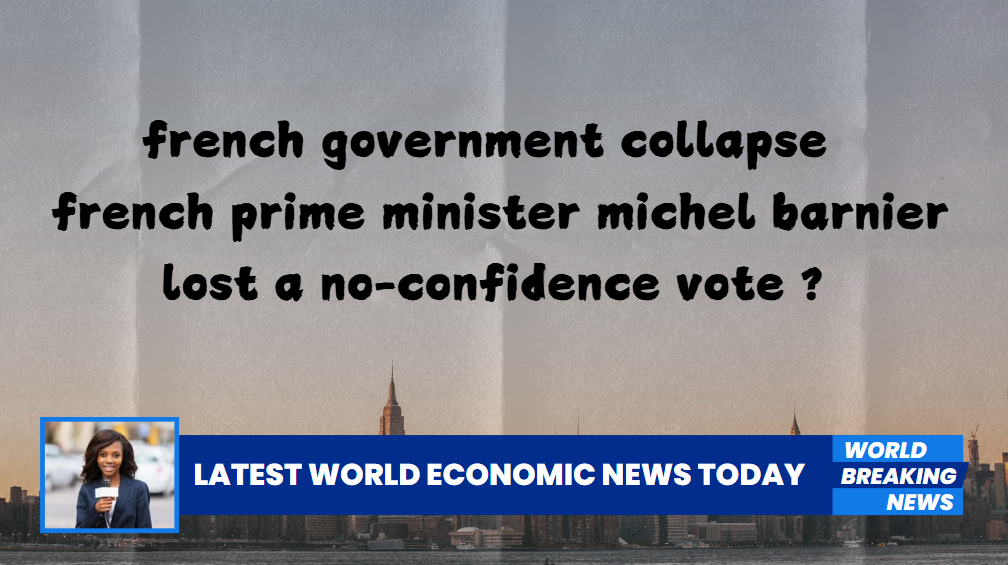French Government Collapse: Prime Minister Michel Barnier Loses No-Confidence Vote : In a dramatic turn of events, French Prime Minister Michel Barnier lost a no-confidence vote, leading to the collapse of his government. The political crisis marks a significant moment in France’s contemporary history, underlining tensions within the nation’s parliament and the growing challenges facing its leadership.

What Led to the No-Confidence Vote?
The no-confidence vote was triggered by a series of political missteps, economic challenges, and growing public dissatisfaction with Barnier’s administration. Opposition parties, emboldened by public protests and internal dissent, accused the government of failing to address pressing economic issues and mishandling key legislative reforms.
Barnier’s administration faced mounting criticism over:
- Economic Instability: Unemployment rates had surged, and inflationary pressures added to public discontent.
- Pension Reforms: Controversial pension reform proposals sparked widespread protests, with unions and workers taking to the streets.
- Political Division: The governing coalition was increasingly fragmented, with internal disputes weakening its ability to pass critical legislation.
The tipping point came when several members of Barnier’s own party abstained or voted against him during the no-confidence motion, sealing his fate.
The Mechanics of the No-Confidence Vote
A no-confidence vote is a parliamentary procedure used to assess whether the sitting government retains the confidence of the legislative body. In France, such a vote requires a majority of the National Assembly’s 577 deputies to declare their lack of confidence in the prime minister and their government.
The vote against Barnier passed with a narrow but decisive margin, signaling a profound loss of support even within his political base.
Immediate Consequences of the Collapse
- Dissolution of the Cabinet: With the prime minister losing the vote, the government is officially dissolved. This leaves France in a state of political limbo until a new administration is formed.
- Presidential Role: President Emmanuel Macron is now tasked with either appointing a new prime minister or dissolving the National Assembly to call for fresh elections. This decision will shape the political landscape for years to come.
- Public Unrest: The government’s collapse could intensify existing protests, as citizens demand more accountability and concrete solutions to economic woes.
Broader Implications for France
This political crisis highlights deeper issues within France’s governance and society. It raises questions about the effectiveness of the parliamentary system in addressing the needs of a diverse and increasingly polarized electorate.
- Economic Challenges: The new government will inherit a fragile economy and must prioritize addressing inflation, unemployment, and social inequality.
- European Union Relations: Barnier, a seasoned diplomat and former EU negotiator, played a pivotal role in shaping France’s relationship with the European Union. His departure may create uncertainty regarding France’s stance on key EU policies.
- Rise of Opposition Parties: The collapse of Barnier’s government is a boon for opposition parties, particularly the far-right and far-left, who may capitalize on the public’s discontent in upcoming elections.
What’s Next for France?
The political vacuum left by Barnier’s departure could lead to significant changes in France’s leadership and policy direction. Potential scenarios include:
- Appointment of a Consensus Candidate: Macron may seek a politically neutral figure to unite the fractured parliament.
- Early Elections: Dissolving the National Assembly would allow the French people to decide the next government, albeit amid heightened political tensions.
- Policy Shifts: Any new administration will likely distance itself from Barnier’s policies to restore public trust.
Conclusion
The fall of Michel Barnier’s government is a stark reminder of the volatility of contemporary politics. As France navigates this critical juncture, its leaders must address the root causes of public dissatisfaction while steering the nation toward stability and growth.
In the coming weeks, all eyes will be on President Macron and the steps he takes to guide France through this challenging period. How France manages this political crisis will not only determine its domestic trajectory but also influence its role on the global stage.


